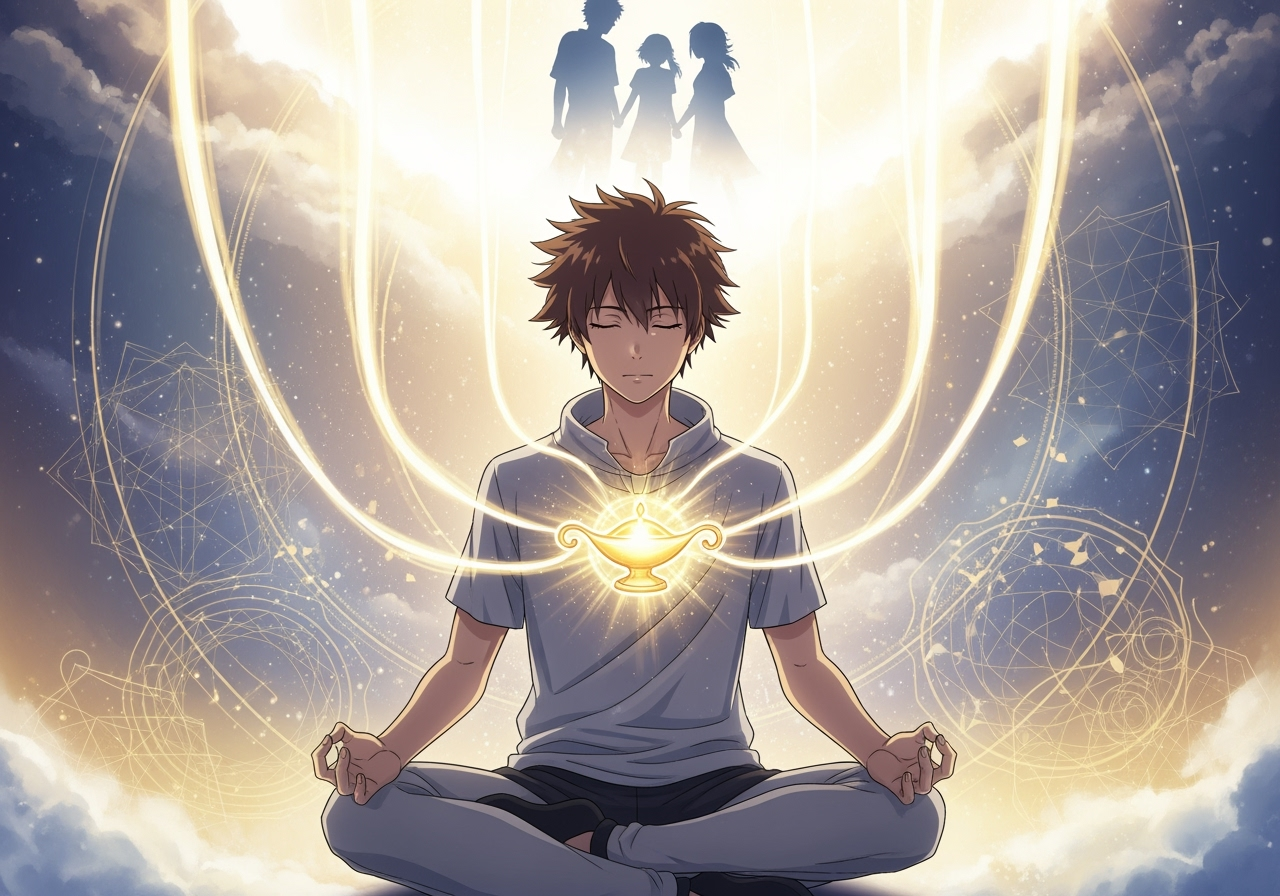God’s breath consciousness is more than a theological concept—it’s the fundamental reality that defines human existence. It’s potentially the key to understanding eternal life. Every human being knows one undeniable truth: they exist. Not because someone told them so, not because they read it in a book, but because consciousness itself bears witness to its own reality.
This immediate, unquestionable awareness might be more than just the byproduct of a complex brain. It might be the very breath of God breathed into human form.
The Divine Breath of Being: Understanding God’s Breath Consciousness
When Genesis tells us that “the LORD God formed man of the dust of the ground, and breathed into his nostrils the breath of life; and man became a living soul,” it reveals something profound about the origin of consciousness. The Hebrew word neshamah (breath of life) describes not just biological function, but the divine breath that creates awareness itself.
This isn’t evolved intelligence—it’s God’s breath consciousness entering matter to create conscious beings.
King Solomon’s Proverbs confirms this understanding: “The spirit of man is the lamp of the LORD, searching all the inward parts of the belly” (Proverbs 20:27). Consciousness isn’t just a feature we possess—it’s God’s lamp within us, His light illuminating our inner being. This lamp, this God’s breath consciousness, is the very image of God we were created to carry.
What Makes Human Consciousness Unique
Consider what makes human consciousness unique. We don’t just respond to stimuli like sophisticated biological machines. We’re aware that we’re aware. We can contemplate our own existence, make moral choices that go against pure instinct, and create with intention rather than mere programming.
This isn’t just advanced intelligence—it’s a fundamentally different kind of existence. It’s lit by the lamp of the LORD within us.
If God is the ultimate conscious being—aware, intentional, creative—then God’s breath consciousness becomes the divine spark we carry. Not moral reasoning alone, but the very capacity for awareness itself, breathed into us by our Creator.
The Stages of Knowing: Developing Spiritual Awareness
The Psalms teach us to “Be still, and know that I am God” (Psalm 46:10). The Hebrew word yada for “know” here means experiential, intimate knowing—not intellectual understanding, but direct awareness through relationship.
This same concept appears when Jesus defined eternal life in John 17:3: “This is eternal life: that they know you, the only true God, and Jesus Christ whom you have sent.” The word “know” here carries the weight of gnosis—the same intimate, experiential awareness David wrote about centuries earlier.
But why must this knowing develop in stages? If we carry God’s lamp within us, why isn’t our awareness complete from the beginning?
Progressive Spiritual Development
Perhaps because God’s breath consciousness, like everything else in creation, is designed to grow according to divine patterns. King Solomon’s wisdom literature suggests that understanding comes progressively: “The path of the righteous is like the morning sun, shining ever brighter till the full light of day” (Proverbs 4:18).
There’s a deeper mathematical signature here that connects sacred geometry to natural growth patterns. It’s a blueprint of divine creation that seems to govern how consciousness develops, though the full picture remains a mystery worth exploring.
Paul’s experience of being “caught up to the third heaven” (2 Corinthians 12:2) confirms what the Old Testament suggested—multiple levels of spiritual consciousness exist. What we experience now might be just the first stage of awareness. It’s enough for God’s lamp within us to recognize its source and seek deeper relationship, but not yet the fullness of divine knowing.
Death as Elevation, Not Termination
Here’s where conventional thinking about death might be backwards. We see death from the survivor’s perspective—as loss, ending, separation. But what if death is actually the removal of everything that dims God’s lamp within us?
Most humans experience the death of others during their lifetime, while none has experienced their own death. We innately recognize when death occurs out of natural order—a child’s death feels especially tragic because it violates our deep sense of how life should unfold.
However, what if death, from the deceased person’s perspective, is not the extinguishing of God’s lamp, but its full illumination?
The Spirit Returns to God
King Solomon wrote, “Then shall the dust return to the earth as it was: and the spirit shall return unto God who gave it” (Ecclesiastes 12:7). If God’s breath consciousness is God’s breath within us, then death might be that breath returning to its source—not ending, but homecoming.
The lamp of the LORD, no longer constrained by physical limitations, free to shine with the full brightness it was always meant to have.
If consciousness is the image of God, and if God’s consciousness encompasses all reality, then death might be the removal of the limitations that currently constrain our awareness. The static that prevents us from hearing clearly, the boundaries that keep us from seeing the full picture—all swept away as the spirit returns to God who gave it.
The Gentle Guidance System: Recognizing Divine Direction
Most of us have experienced what feel like gentle nudges—moments when circumstances align in ways that seem too perfect to be coincidental. King Solomon observed this phenomenon: “A man’s heart plans his way, but the LORD directs his steps” (Proverbs 16:9).
What feels like coincidence might actually be God’s breath consciousness within us responding to His guidance, even when we’re not consciously aware of it.
Personal Experience of Divine Timing
I experienced this recently when facing multiple financial pressures. My wife needed $385 for unexpected expenses, we needed $200 for our children’s activities, I wanted $2000 for vacation savings, and $1000 for a personal reward. When I nervously opened our safe, expecting to have to rob one fund to help another, there was exactly $3585 in cash.
That same day, exhausted from helping my brother with his business issues, I wondered if I was spending my energy properly. I hadn’t weighed myself in over a month, hadn’t been eating well or working out. When I finally stepped on the scale, I’d only gained five pounds. The message was clear: “Keep going. You don’t know why, but there is purpose here.”
Trusting Divine Guidance
These weren’t dramatic supernatural interventions. They were gentle confirmations that Solomon would have recognized: “Trust in the LORD with all your heart and lean not on your own understanding; in all your ways submit to him, and he will make your paths straight” (Proverbs 3:5-6).
In those moments, all I could think was “God is good. God really is good.” There was a peace that went beyond relief—a deeper knowing that I was exactly where I was supposed to be. God’s breath consciousness within me was recognizing His perfect timing.
The Connection Between Worlds: Elevated Spiritual Awareness
If God’s breath consciousness continues after death and expands to higher levels of awareness, and if multiple realities exist simultaneously as quantum physics suggests, then our deceased loved ones might be operating from a perspective we can’t currently comprehend. Their spirits, having returned to God who gave them, might now see with clarity what Solomon called “the end of a matter” (Ecclesiastes 7:8).
They could see all possible outcomes, understand the perfect timing of events, and somehow participate in guiding circumstances toward our best possible timeline. Not controlling events—that remains God’s domain—but helping us recognize His guidance more clearly. Their fully illuminated consciousness works in harmony with His will.
Spiritual Connection Through Living Relationships
But this spiritual connection isn’t unique to death. We experience similar guidance and support through other relationships while we’re alive—the mentor who appears at exactly the right moment, the friend whose words provide perfect clarity, the person whose presence brings peace during chaos.
The same God’s breath consciousness that connects us to deceased loved ones operates through our living relationships as well. God’s lamp within each person is capable of recognizing and responding to His light in others.
The difference is that our deceased loved ones now operate from an elevated level of this same consciousness connection. Their spirits have returned to God who gave them, able to see His plan more clearly than we can from our current perspective.
The Separation We Know: Understanding Changed Relationships
The profound sadness we feel about death isn’t actually different from other relationship separations we experience in life. Divorce changes the nature of connection with a spouse. Estrangement shifts our relationship with family members. Friends drift away, and we lose the daily intimacy we once shared, even though they continue to exist and may wish us well from a distance.
Death might be similar—not the extinguishing of God’s lamp within them, but a fundamental change in the type of relationship we can have. Our deceased loved ones haven’t ceased to exist; they’ve moved to a level of consciousness where direct communication as we knew it is no longer possible.
The Purpose of Spiritual Separation
Their spirits have returned to God who gave them, and from that elevated perspective, they can influence our timeline for good. But we can’t have the relationship with them that we once knew.
Yet this separation serves a purpose. It forces us to develop our own relationship with God rather than relying on intermediaries. As King Solomon wrote, “The spirit of man is the lamp of the LORD”—each of us carries that divine light individually. Our deceased loved ones don’t replace our connection to the Creator—they enhance it. They help us see His hand in our lives more clearly while we learn to recognize that same guidance through our living relationships.
Learning to Listen: Developing Spiritual Sensitivity
God’s power works through us whether we want it to or not. His lamp within us is always burning, always ready to illuminate His guidance. The gentle nudges aren’t whispers—they’re clear direction that we often miss because of the static in our lives.
Worry, the need to control, the noise of a world that demands constant attention—all of this prevents us from recognizing what God’s breath consciousness within us is already revealing.
King Solomon understood this: “In their hearts humans plan their course, but the LORD establishes their steps” (Proverbs 16:9). In my experience, as long as I listen intently enough to stay within the guard rails, no matter how bad I worry a situation will become, it usually ends up being okay. When I worry and try to control rather than trusting that “the LORD establishes their steps,” that’s when I’m most likely to jump the guard rails and create real problems.
The Solution: Spiritual Stillness
The Psalms teach us the solution: “Be still, and know that I am God.” The stillness isn’t inactivity—it’s the quieting of our own agenda long enough to let God’s breath consciousness within us illuminate His path forward.
The Deeper Desire: Seeking Direct Relationship with God
What I want most isn’t to understand the complete mechanics of how consciousness works across dimensions. What I desire intensely is what the men who walked with God had—direct relationship with God. Not just faith about God, but actual communion with Him.
Noah, Moses, Jacob, Jesus—they all experienced God in ways that went beyond belief into direct knowing. Their consciousness was fully awakened to His presence.
I want that relationship. I want to be able to have a conversation with God, to see His face in whatever form that might take. If God wants a relationship with me beyond faith, I want that relationship as intently as I want anything else in this world.
The Paradox of Spiritual Pursuit
But I’ve come to believe this deeper relationship can’t be pursued like a goal to be achieved. King Solomon’s wisdom suggests it can only be received as a blessing: “The fear of the LORD is the beginning of wisdom, and knowledge of the Holy One is understanding” (Proverbs 9:10).
The purpose can’t be hunted down—it can only be discovered through faithful listening and obedient following. We must allow God’s breath consciousness within us to burn ever brighter as we draw closer to its source.
The Eternal Question: Consciousness and Eternal Life
If God’s breath consciousness is God’s breath within us, and if death is that breath returning to its source rather than termination, then what we call “eternal life” might not be something that begins after we die. It might be the gradual awakening of God’s lamp within us to its divine source—a process that begins now and continues beyond physical death.
Our deceased loved ones, their spirits having returned to God who gave them, with their elevated consciousness and clearer perception of His plan, might be helping us learn to listen without static. They help us trust without controlling, to recognize the gentle nudges that have always been there. But that same spiritual connection operates through our living relationships as well—consciousness connecting with consciousness. God’s lamp within each person is capable of recognizing His light in others.
We are not God. There is a Creator, and we are creations who received His breath. But that breath—God’s breath consciousness—might be far more profound than we’ve understood. It might be the very mechanism by which we “know” God in the deepest sense. The lamp of the LORD within us is capable of illuminating the bridge between finite human experience and infinite divine reality.
The question isn’t whether consciousness survives death. The question is whether we’re learning to tend God’s breath consciousness within us properly while we’re alive—to recognize His goodness, to trust His timing, and to stay within the guard rails of His perfect plan.
Because if consciousness is God’s breath within us, then how we develop it now matters not just for this life, but for whatever elevated awareness awaits us when our spirit returns to God who gave it.
Ready to explore more spiritual insights from the road? Follow me on Facebook, Instagram, YouTube, and X for honest perspectives on faith, consciousness, and life’s deeper meanings. Don’t forget to subscribe to our weekly newsletter for more spiritual wisdom and philosophical insights!



